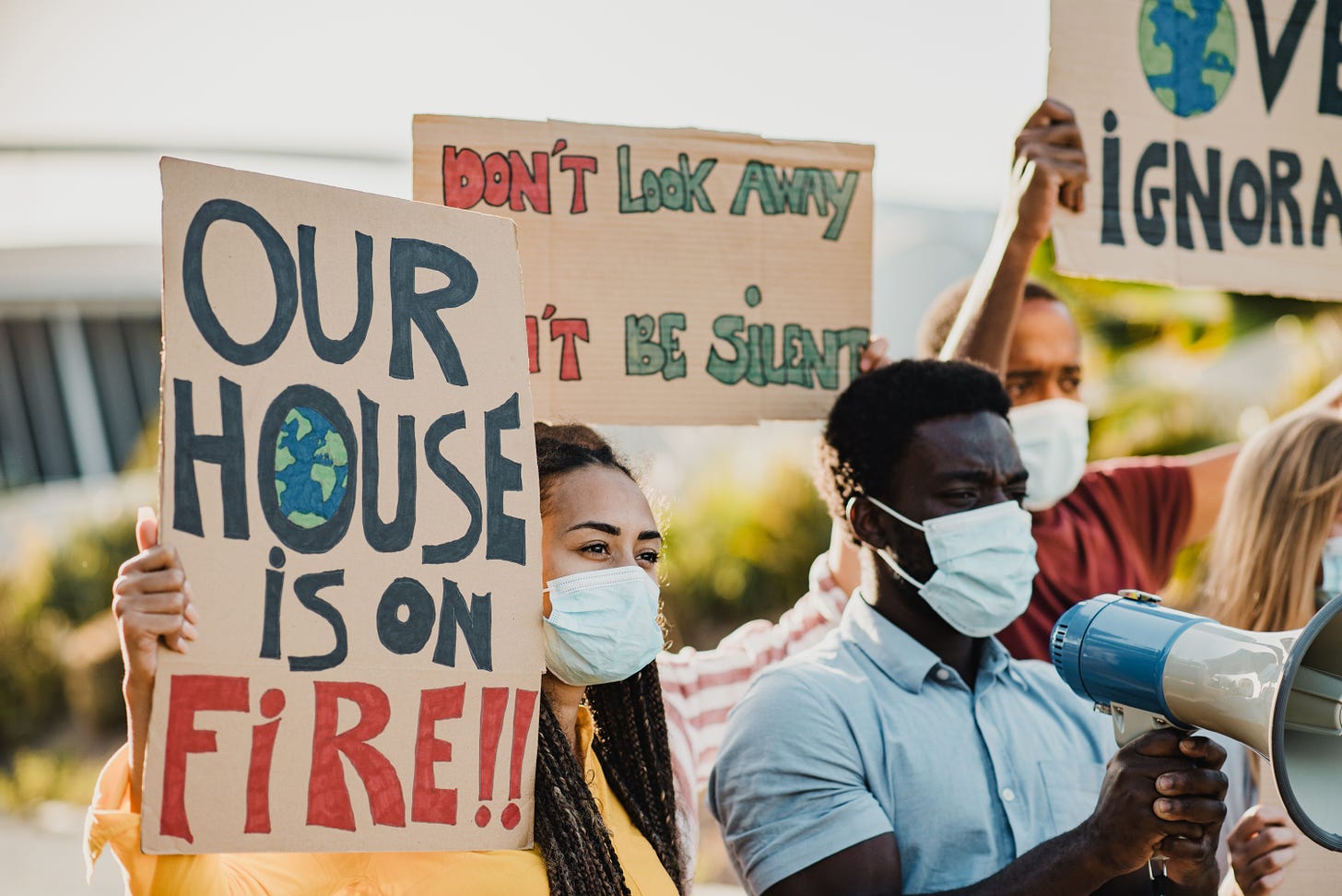By Laura Dodsworth and Ben Pile.
Seven climate activists between the ages of 18 and 27 went on hunger strike for 27 days to protest climate change in Germany last year. Several of the group – called ‘The Last Generation’ – ended up in hospital. One of the protestors said, “I am very weak, and get dizzy when I stand up. But this is nothing compared to what we can expect when the climate crisis unleashes a famine here in Europe in 20 years.”
Daniel Walsh, 17, part of XR Youth London said climate crisis has tipped young people to breaking point. The XR rebellion is “about creating those communities where people are held in their grief and their terror of what’s going on.”
According to a study ‘Young People’s Voices on Climate Anxiety, Government Betrayal and Moral Injury: A Global Phenomenon’ these two activists may not be in the minority. Among 10,000 respondents, 59% of young people aged 16 to 25 are extremely or very worried about climate change, 75% said that they think the future is frightening and 83% think people have failed to take care of the planet.
Perhaps we should not be surprised, as young people are constantly told that the end is nigh. Climate change is often in the news, social media algorithms appear to favour climate protest stories, and the UK’s soap opera stories all converged on climate issues during COP26. Greta Thurnburg has inspired the fears of a generation with her house on fire, stolen dreams and childhood and “30 years of blah, blah, blah”.
On the internet, the younger generation can tune into videos like ‘Advice to Young People as They Face Annihilation’ from Roger Hallam, the founder of Extinction Rebellion. He claimed we must get emissions to zero within months, otherwise humanity will be wiped out. (We’re still here, for now, but more on claims which don’t materialise in a little while.)
On Earth Day, a new Natural History GCSE was announced, or “saving the world” as some have described it. It is part of a wider move towards “greening the curriculum” according to examination awarding body Oxford Cambridge and RSA. While the curriculum is yet to be finalised, we can expect it to focus on anthropogenic climate change:
Mark Maslin, a geographer at University College London, says it will be vital that the role of humans is central. He says humans have taken a quarter of Earth’s land, and the total weight of land mammals today is 30 per cent humans, 67 per cent our livestock and pets, and only 3 per cent wild mammals. “So there is no such thing as natural. It is the nature that we have created.” Climate change will be part of the course, but it will primarily cover its impact on the natural world, such as how a warming world affects where bumblebees are capable of surviving. The role of nature to curb climate change, such as how much carbon a kelp meadow can sequester, may be covered but to a lesser degree.
This new GCSE will be no surprise to anyone who paid attention to this statement from Nadhim Zahawi last year.
“We want to deliver a better, safer, greener world for future generations of young people, and education is one of our key weapons [our emphasis] in the fight against climate change. Empowering teachers in every school to deliver world-leading climate change education will not only raise awareness and understanding of the problem but also equip young people with the skills and knowledge to build a sustainable future.”
There is a bold contradiction at play. The government has pledged that education should be politically impartial, yet is arguably using education to further controversial political Net Zero policies. Perhaps the young are being schooled for the hair shirts Boris Johnson promised we would not need. In fact, the government has put education at the heart of its Sustainability and Climate Change Strategy.
As Chairman Mao once pronounced, “all work in school is for changing the thinking of the student.” The Nudge Unit’s rapidly unpublished ‘Net Zero: principles for successful behaviour change initiatives – Key principles from past government-led behaviour change and public engagement initiatives’, said:
“Education also plays a key role in establishing new norms. Indeed, schools have often been a vector for building national identity. Children can then in turn have profound impacts on their parents, or through other means by making new behaviours observable.”
In the same vein, the Nudge Unit and Sky recommended in their joint report that broadcasters should use kids’ content to encourage “positive environmental behaviours” amongst children and their parents due to the multi-generational spillover effect.
For all the government’s concern about the politicisation of education, it doesn’t just turn a blind eye towards greening the curriculum, but encourages it as part of a considered behavioural science approach aimed at ‘greenwashing’ our children’s brains.

The arguments in favour of leveraging education and children for climate are obviously to mitigate climate crisis, to save the planet, to save the children themselves. Some will believe the ends justify the means. But there are two obvious concerns, at least to anyone who has been somewhat red-pilled by the dogmatic following of the ‘The Science’ during Covid, alongside the behavioural science approach to psychologically kettling the population to fall in line with the rules. Firstly, the validity of the scientific ingests and the ‘science is settled’ approach to climate. Secondly, the ethics of weaponising education and the subsequent impact on children’s mental health.
Both of these concerns are manifest in existing GCSE materials, and hint at trouble to come in the new Natural History GCSE.
The BBC’s GSCE revision website, tells students of geography under the Edexcel, AQA and WJEC exam boards that as climate changes, “diseases such as malaria increase, an additional 280 million people may be affected”. Students following the CCEA syllabus learn that “Death rates will increase. The UN estimate that over 300,000 people die each year already due to climate change. Diseases such as malaria and cholera will also be on the increase.”
But these claims have little foundation. The WHO did estimate in 2002 that 150,000 people die each year as a result of climate change increasing the prevalence of malaria, diarrhoeal diseases and malnutrition. Since then, however, the WHO estimates that deaths from malaria have fallen by 40 per cent. Deaths from malnutrition and diarrheal diseases have also approximately halved since the turn of the century.
Similarly, Key Stage 3 students learn that “Climate change and its effects as a result of global warming include: […] Extreme weather events like flooding and heat waves, cold snaps and violent storms. […] Increases in the number and strength of forest fires.” And these claims too are controversial, more the mainstays of green political activism than of conclusive empirical observations.
Although the IPCC does find evidence of increased numbers of heatwaves, it finds little evidence of climate change in statistics relating to floods, storms and droughts, and none at the global scale relating to wildfires. No doubt some activists and scientists would want to challenge such an interpretation of the IPCC’s statement of confidence in these observations as indicating growing risks. But such conversations would be academic, whereas the issue at hand is what children are taught as fact. These ‘facts’ may have led many children to believe – through the omission of the IPCC’s explicitly-stated uncertainty – the manner of their imminent deaths. The statement of hypothesis as fact should be challenged, especially where impressionable minds are at stake.
These and similar claims have been at the centre of the UK’s curriculum for most of this century. A 2014 study of GCSE textbooks found that as early as 2001, children were learning that “Scientists believe that a 1◦C increase in world temperature is all that the world can tolerate before climatic chaos sets in.” A 2009 GCSE textbook claimed that “Climate change isn’t something that is going to happen in the future – it’s happening now! Disasters, like the severe droughts in Niger, in subSaharan Africa, in 2005–6 and 2009, are wrecking people’s lives more and more frequently. And it’s going to get worse.” Politically-motivated and extremely alarmist claims have taught the current generation of children – and very likely their parents too – that they will die because of climate change.
Although scientific evidence may point to the fact of a warming planet, there remains very little evidence of what activists claim will be the inevitable consequences of that warming: a climate emergency. In order to sustain this idea, green activists and journalists omit historical context and perspective from their narratives.
For example, a 2019 BBC documentary called Mongolia: A toxic warning to the world, argued that the developing country was “grappling with apocalyptic air pollution” more than any other. It argued that climate change was driving Mongolians away from traditional nomadic, herding lifestyles on the vast Steppe into cities, where coal-burning was creating a “toxic air” crisis, afflicting 90% of children in Ulaanbaatar. But this devastating report omitted the fact that in the 1950s, the Mongolian infant mortality rate was close to 30 per cent. As recently as 1978, it was still higher than 17 per cent, and between 2000 and today, the figure fell from 6.5% to 1.5%. Perhaps economic opportunity, rather than climate change, is driving the urban to rural Mongolian migration, enabling escape from a harsh environment in which very many children died.
Despite climate change concerns, children today – whether in the UK or in Mongolia – face a world of opportunity and better health that was not available to preceding generations. The selection of facts by journalists and teachers is ideological, deliberate and intended to achieve a particular political goal.
This brings us back to the study ‘Young People’s Voices on Climate Anxiety, Government Betrayal and Moral Injury: A Global Phenomenon’. It was conducted by CAST, the Centre for Climate Change and Social Transformations. Although it purports that young people are very frightened about climate change, the research only sought agreement with very negative statements such as “the future is frightening” and “humanity is doomed”. Respondents were not asked to agree with any neutral or positive statements. If they weren’t frightened about a perilous future at the start of the survey, they probably were by the end.
The report concluded that “There is an urgent need for further research into the emotional impact of climate change on children and young people and for governments to validate their distress by taking urgent action on climate change.” Most of the young respondents are very unlikely to have experienced any dangerous effects of climate change in the real world. What is creating emotional impact is media coverage, political rhetoric and alarmist education in schools. Distress doesn’t need to be ‘validated’ by policy and should not dictate it. The distress felt by children and young people could be managed by more careful, considerate and contextual communication.
CAST as an organisation appears to be politically motivated. The director, Professor Lorraine Whitmarsh has said, “We want to work closely with people and organisations to achieve positive low-carbon futures – transforming the way we live our lives, and reconfiguring organisations and cities.” This research was created by people who are frustrated by “inadequate government response” and appears to have been designed to both provoke and justify governmental response. Indeed, it even indicts a lack of governmental response as “moral injury”.
Regardless of the extent of anthropogenic climate change, and the future implications, it is deeply alarming that young people feel that they and the planet do not have a future. And it is ethically concerning that they are being weaponised to push political climate goals. There is no hope without agency, and young people have been told repeatedly that the end is nigh. This is not responsible or fair of adults.
Children are not climate foot soldiers. Activists and politicians should fight their own battles.
Source link
Author Laura Dodsworth







